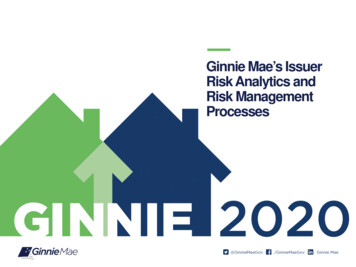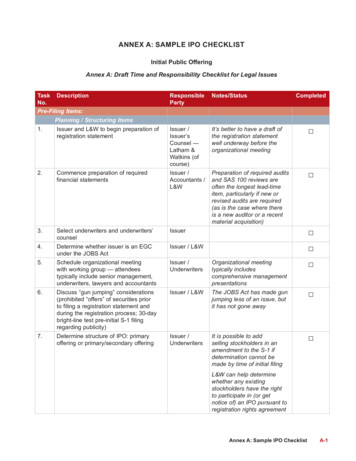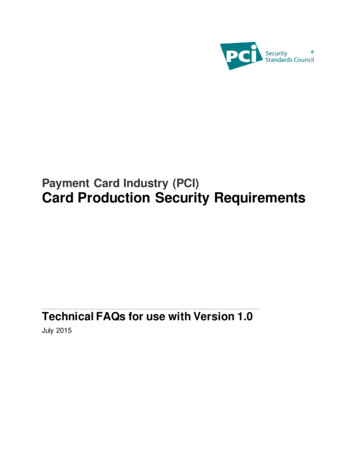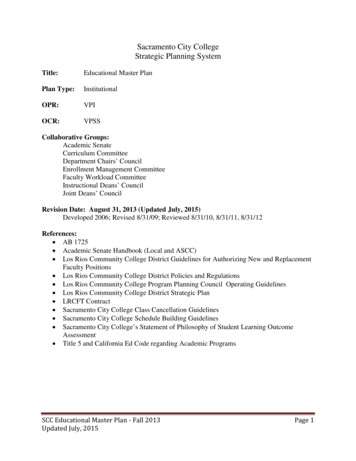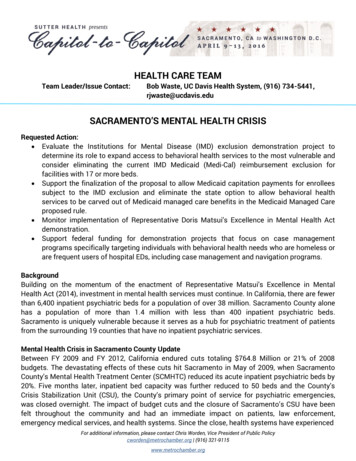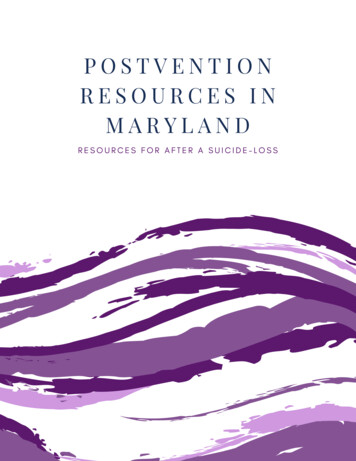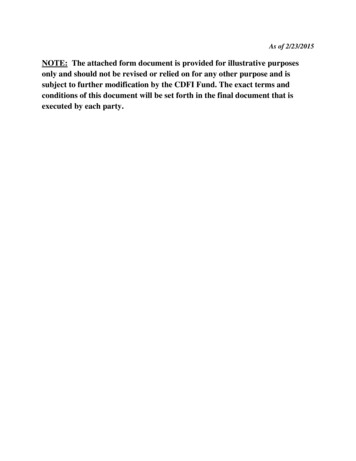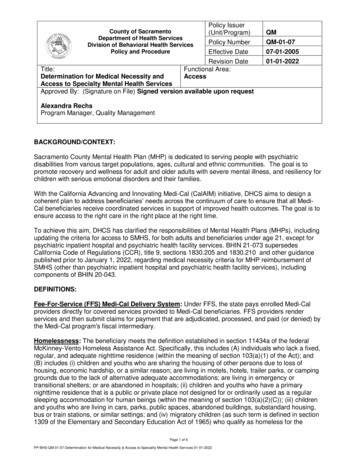
Transcription
County of SacramentoDepartment of Health ServicesDivision of Behavioral Health ServicesPolicy and ProcedurePolicy Issuer(Unit/Program)QMPolicy NumberQM-01-07Effective DateRevision DateFunctional Area:Access07-01-200501-01-2022Title:Determination for Medical Necessity andAccess to Specialty Mental Health ServicesApproved By: (Signature on File) Signed version available upon requestAlexandra RechsProgram Manager, Quality ManagementBACKGROUND/CONTEXT:Sacramento County Mental Health Plan (MHP) is dedicated to serving people with psychiatricdisabilities from various target populations, ages, cultural and ethnic communities. The goal is topromote recovery and wellness for adult and older adults with severe mental illness, and resiliency forchildren with serious emotional disorders and their families.With the California Advancing and Innovating Medi-Cal (CalAIM) initiative, DHCS aims to design acoherent plan to address beneficiaries’ needs across the continuum of care to ensure that all MediCal beneficiaries receive coordinated services in support of improved health outcomes. The goal is toensure access to the right care in the right place at the right time.To achieve this aim, DHCS has clarified the responsibilities of Mental Health Plans (MHPs), includingupdating the criteria for access to SMHS, for both adults and beneficiaries under age 21, except forpsychiatric inpatient hospital and psychiatric health facility services. BHIN 21-073 supersedesCalifornia Code of Regulations (CCR), title 9, sections 1830.205 and 1830.210 and other guidancepublished prior to January 1, 2022, regarding medical necessity criteria for MHP reimbursement ofSMHS (other than psychiatric inpatient hospital and psychiatric health facility services), includingcomponents of BHIN 20-043.DEFINITIONS:Fee-For-Service (FFS) Medi-Cal Delivery System: Under FFS, the state pays enrolled Medi-Calproviders directly for covered services provided to Medi-Cal beneficiaries. FFS providers renderservices and then submit claims for payment that are adjudicated, processed, and paid (or denied) bythe Medi-Cal program's fiscal intermediary.Homelessness: The beneficiary meets the definition established in section 11434a of the federalMcKinney-Vento Homeless Assistance Act. Specifically, this includes (A) individuals who lack a fixed,regular, and adequate nighttime residence (within the meaning of section 103(a)(1) of the Act); and(B) includes (i) children and youths who are sharing the housing of other persons due to loss ofhousing, economic hardship, or a similar reason; are living in motels, hotels, trailer parks, or campinggrounds due to the lack of alternative adequate accommodations; are living in emergency ortransitional shelters; or are abandoned in hospitals; (ii) children and youths who have a primarynighttime residence that is a public or private place not designed for or ordinarily used as a regularsleeping accommodation for human beings (within the meaning of section 103(a)(2)(C)); (iii) childrenand youths who are living in cars, parks, public spaces, abandoned buildings, substandard housing,bus or train stations, or similar settings; and (iv) migratory children (as such term is defined in section1309 of the Elementary and Secondary Education Act of 1965) who qualify as homeless for thePage 1 of 6PP-BHS-QM-01-07-Determination for Medical Necessity & Access to Speciality Mental Health Services 01-01-2022
purposes of this subtitle because the children are living in circumstances described in clauses (i)through (iii).Involvement in Child Welfare: The beneficiary has an open child welfare services case, or thebeneficiary is determined by a child welfare services agency to be at imminent risk of entering fostercare but able to safely remain in their home or kinship placement with the provision of services undera prevention plan, or the beneficiary is a child whose adoption or guardianship occurred through thechild welfare system. A child has an open child welfare services case if: a) the child is in foster care orin out of home care, including both court-ordered and by voluntary agreement; or b) the child has afamily maintenance case (pre-placement or post-reunification), including both court ordered and byvoluntary agreement. A child can have involvement in child welfare whether the child remains in thehome or is placed out of the home.Juvenile Justice Involvement: The beneficiary (1) has ever been detained or committed to ajuvenile justice facility, or (2) is currently under supervision by the juvenile delinquency court and/or ajuvenile probation agency. Beneficiaries who have ever been in custody and held involuntarily throughoperation of law enforcement authorities in a juvenile justice facility, including youth correctionalinstitutions, juvenile detention facilities, juvenile justice centers, and other settings such as bootcamps, ranches, and forestry/conservation camps, are included in the “juvenile justice involvement”definition. Beneficiaries on probation, who have been released home or detained/placed in foster carepending or post-adjudication, under probation or court supervision, participating in juvenile drug courtor other diversion programs, and who are otherwise under supervision by the juvenile delinquencycourt and/or a juvenile probation agency also meets the “juvenile justice involvement” criteria.Managed Care Plan (MCP): MCPs are responsible for the Medi-Cal physical healthcare benefit.They are also responsible for a portion of the mental health benefit, and must provide specifiedservices to adults diagnosed with a mental health disorder, as defined by the current Diagnostic andStatistical Manual of Mental Disorders (DSM), that results in mild to moderate distress or impairmentof mental, emotional, or behavioral functioning. MCPs must also provide medically necessary nonspecialty mental health services to children under the age of 21. MCPs refer to and coordinate withcounty Mental Health Plans (MHPs) for the delivery of specialty mental health services (SMHS).Medical Necessity: The criteria that identify service need based on inclusion of specific signs,symptoms, and conditions and proposed treatment associated with mental illness. Determination ofmedical necessity requires inclusion of a covered diagnosis; an established level of impairment; anexpectation that specialty mental health treatment is necessary to address the condition; and thecondition would not be responsive to physical health care based treatment. Medical necessity isdefined by the California Code of Regulations and is contained in a variety of State Department ofHealth Care Services (DHCS) notices and letters delineating requirements for county mental healthservices.Medically Necessary Services: Pursuant to Welfare and Institutions Code section 14184.402(a), forindividuals 21 years of age or older, a service is “medically necessary” or a “medical necessity” whenit is reasonable and necessary to protect life, to prevent significant illness or significant disability, or toalleviate severe pain as set forth in Welfare and Institutions Code section 14059.5.For individuals under 21 years of age, a service is “medically necessary” or a “medical necessity” ifthe service meets the standards set forth in Section 1396d(r)(5) of Title 42 of the United States Code.This section requires provision of all Medicaid-coverable services necessary to correct or ameliorate amental illness or condition discovered by a screening service, whether or not such services arecovered under the State Plan. Furthermore, federal guidance from the Centers for Medicare &Medicaid Services (CMS) makes it clear that mental health services need not be curative orrestorative to ameliorate a mental health condition. Services that sustain, support, improve, or makemore tolerable a mental health condition are considered to ameliorate the mental health condition,and are thus medically necessary and covered as EPSDT services.Page 2 of 6PP-BHS-QM-01-07-Determination for Medical Necessity & Access to Speciality Mental Health Services 01-01-2022
Services provided to a beneficiary must be medically necessary and clinically appropriate to addressthe beneficiary’s presenting conditionNon-Specialty Mental Health Services (NSMHS): NSMHS are delivered via MCP and FFS deliverysystems and are provided to recipients 21 years and over with mild-to- moderate distress or mild-tomoderate impairment of mental, emotional, or behavioral functioning resulting from mental healthdisorders. NSMHS may be provided to recipients under age 21, to the extent otherwise eligible forservices through EPSDT, regardless of level of distress or impairment or the presence of a diagnosis,and recipients of any age with potential mental health disorders not yet diagnosed.Specialty Mental Health Services (SMHS): Specialty mental health services include but are notlimited to: Assessment, Plan Development, Rehabilitation Services, Therapy Services, Collateral,Medication Support Services, Targeted Case Management, Crisis Intervention, Intensive CareCoordination (ICC), Intensive Home-Based Services (IHBS) and Therapeutic Behavioral Services(TBS). SMHS are provided to Medi-Cal beneficiaries through County Mental Health Plans (MHPs). Allthe MHPs are part of county mental health or behavioral health departments and the MHP canprovide services through its own employees or through contract providers.PURPOSE:This policy and procedure updates Sacramento County guidelines and criteria for accessing SpecialtyMental Health Services (SMHS) as described in the Department of Health Care Services’ (DHCS)Behavioral Health Information Notice (BHIN) 21-073. Under this BHIN, access criteria and medicalnecessity criteria are separated and redefined.DETAILS:A. Process to Determine Medical Necessity: All Staff conducting the initial assessment meet thequalifications for Licensed Professional of Healing Arts (LPHA) and function as part of the MHPAccess Team or specifically designated entry points of services. The process to determineMedical Necessity is as follows:i.The Access Team will make an initial determination of Medical Necessity criteria foroutpatient services. The Access Team will document their determination and refer to theappropriate provider based on said determination.ii.The Access Team designates additional specified points of entry for vulnerablepopulation in order to provide presumptive determination of eligibility to prevent barriers tocare.iii.Service providers receiving assignments from the Access Team are required to confirmmedical necessity and to complete the appropriate assessment upon contact withreferred individuals.iv.Service providers will continue to review and confirm medical necessity annually atminimum.B. Criteria for Adult Beneficiaries to Access the SMHS Delivery System: For beneficiaries 21years of age or older, a county MHP shall provide covered SMHS for beneficiaries who meet bothof the following criteria, (1) and (2) below:1. The beneficiary has one or both of the following:a. Significant impairment, where impairment is defined as distress, disability, ordysfunction in social, occupational, or other important activities.b. A reasonable probability of significant deterioration in an important area of lifefunctioning.ANDPage 3 of 6PP-BHS-QM-01-07-Determination for Medical Necessity & Access to Speciality Mental Health Services 01-01-2022
2. The beneficiary’s condition as described in paragraph (1) is due to either of the following:a. A diagnosed mental health disorder, according to the criteria of the current editionsof the Diagnosis and Statistical Manual of Mental Disorders (DSM) and theInternational Statistical Classification of Diseases and Related Health Problems.b. A suspected mental disorder that has not yet been diagnosed.C. Criteria for Beneficiaries under Age 21 to Access the Specialty Mental Health ServicesDelivery System: For enrolled beneficiaries under 21 years of age, a county MHP shall provideall medically necessary SMHS required pursuant to Section 1396d(r) of Title 42 of the UnitedStates Code. Covered SMHS shall be provided to enrolled beneficiaries who meet either of thefollowing criteria, (1) or (2) below:1. The beneficiary has a condition placing them at high risk for a mental health disorder due toexperience of trauma evidenced by any of the following: scoring in the high-risk range under atrauma screening tool approved by the department,1 involvement in the child welfare system,juvenile justice involvement, or experiencing homelessness.OR2. The beneficiary meets both of the following requirements in a) and b), below:a. The beneficiary has at least one of the following:i. A significant impairmentii. A reasonable probability of significant deterioration in an important area of lifefunctioningiii. A reasonable probability of not progressing developmentally as appropriate.iv. A need for SMHS, regardless of presence of impairment, that are not includedwithin the mental health benefits that a Medi-Cal managed care plan is requiredto provide.ANDb. The beneficiary’s condition as described in subparagraph (2) above is due to one ofthe following:i. A diagnosed mental health disorder, according to the criteria of the currenteditions of the Diagnostic and Statistical Manual of Mental Disorders2 and theInternational Statistical Classification of Diseases and Related HealthProblems.ii. A suspected mental health disorder that has not yet been diagnosed.iii. Significant trauma placing the beneficiary at risk of a future mental healthcondition, based on the assessment of a licensed mental health professional.3If a beneficiary under age 21 meets the criteria as described in (1) above, the beneficiary meetscriteria to access SMHS; it is not necessary to establish that the beneficiary also meets the criteria in(2) above.1MHPs are not required to implement a trauma screening tool until DHCS issues additional guidance regardingapproved tool(s) for the purposes of SMHS access criteria.2 A neurocognitive disorder (e.g., dementia) or a substance-related and addictive disorder (e.g., stimulant usedisorder) are not “mental health disorders” for the purpose of determining whether a beneficiary meets criteria foraccess to the SMHS delivery system. However, MHPs must cover SMHS for beneficiaries with any of thesedisorders if they also have a mental health disorder (or suspected mental health disorders not yet diagnosed)and meet criteria for SMHS as described above.3 Welf. & Inst. Code, § 14184.402(d)Page 4 of 6PP-BHS-QM-01-07-Determination for Medical Necessity & Access to Speciality Mental Health Services 01-01-2022
Additional Coverage Requirements and ClarificationsThis criteria for a beneficiary to access the SMHS delivery system (except for psychiatric inpatienthospital and psychiatric health facility services) set forth above shall not be construed to excludecoverage for, or reimbursement of, a clinically appropriate and covered mental health prevention,screening, assessment, treatment, or recovery service under any of the following circumstances: Services were provided prior to determining a diagnosis, including clinically appropriate andcovered services provided during the assessment process. The prevention, screening, assessment, treatment, or recovery service was not included in anindividual treatment plan.4 The beneficiary has a co-occurring substance use disorder.Per Welfare and Institutions Code section 14184.402(f)(1)(A), a mental health diagnosis is not aprerequisite for access to covered SMHS. This does not eliminate the requirement that all Medi-Calclaims, including SMHS claims, include a CMS-approved ICD-10 diagnosis code.5 In cases whereservices are provided due to a suspected mental health disorder that has not yet been diagnosed ordue to trauma as noted above, options are available in the CMS-approved ICD-10 diagnosis code list.For example, these include codes for “Other specified” and “Unspecified” disorders,” or “Factorsinfluencing health status and contact with health services” (i.e., Z codes). DHCS may provideadditional clarification and technical assistance regarding the use of Z codes.The portion of BHIN 20-043 that limits SMHS to a list of DHCS included ICD-10 diagnoses issuperseded by BHIN 21-073, effective January 1, 2022 (except for psychiatric inpatient hospital andpsychiatric health facility services.)Non-Specialty Mental Health ServicesNon-Specialty Mental Health Services (NSMHS) are delivered by Medi-Cal Managed Care Plans(MCP) and Medi-Cal Fee-for-Service (FFS) providers and include the following:6 Mental health evaluation and treatment, including individual, group and family Psychotherapy7Psychological and neuropsychological testing, when clinically indicated to evaluate a mentalhealth condition.Outpatient services for purposes of monitoring drug therapyPsychiatric consultationOutpatient laboratory, drugs, supplies and supplementMHPs also provide these types of services; however, the level of impairment is typically identified as“moderate to severe” versus the “mild to moderate” level of impairment that supports the provision ofNSMHS.BHIN 21-073 does not change the respective responsibilities of MHPs, Medi-Cal MCPs and the MediCal FFS delivery systems. Services for symptoms or conditions solely due to a medical condition(e.g., traumatic brain injury) remain the responsibility of the MCP or the FFS delivery system.However, SMHS are reimbursable for beneficiaries with medical diagnoses if they also have mentalhealth conditions and meet criteria for SMHS as described above. Coordination of care between theMHP and the MCP may be necessary to address beneficiaries’ needs.4Some SMHS may still require an individual plan of care, such as Targeted Case Management (42 C.F.R. §440.169.). DHCS will issue forthcoming guidance regarding documentation.5 The ICD 10 Tabular (October 1st thru September 30th) at 6 Welf. & Inst. Code, § 14184.402(b)(1)7 Dyadic services will be provided effective 7/1/22.Page 5 of 6PP-BHS-QM-01-07-Determination for Medical Necessity & Access to Speciality Mental Health Services 01-01-2022
Criteria for Beneficiaries to Access Non-Specialty Mental Health ServicesMCPs are required to provide or arrange for the provision of NSMHS for the following populations:8 Beneficiaries 21 years of age and over with mild to moderate distress or mild to moderateimpairment of mental, emotional, or behavioral functioning resulting from mental healthdisorders, as defined by the current Diagnostic and Statistical Manual of Mental Disorders;9Beneficiaries under age 21, to the extent eligible for services through the Medicaid EPSDTbenefit as described above, regardless of level of distress or impairment or the presence of adiagnosis;Beneficiaries of any age with potential mental health disorders not yet diagnosed.REFERENCE(S)/ATTACHMENTS: California Code of Regulations, Title ED POLICIES: All MHP P&P’sAll MHTC P&P’sDISTRIBUTION:Enter XXXXXXDL NameEnter XDL NameMental Health StaffMental Health Treatment CenterAdult Contract ProvidersChildren’s Contract ProvidersSubstance Use, Prevention, andTreatment ServicesSpecific grant/specialty resourceCONTACT INFORMATION: Quality Management ProgramQMInformation@saccounty.net8Welf. & Inst. Code, § 14184.402(b)(2)A neurocognitive disorder (e.g., dementia) or a substance-related and addictive disorder (e.g., stimulant usedisorder) are not “mental health disorders” for the purpose of determining whether a beneficiary meets criteriafor access to the NSMHS delivery system. However, MCPs must cover NSMHS for beneficiaries with any ofthese disorders if they also have a mental health disorder (or suspected mental health disorders not yetdiagnosed) and meet criteria for NSMHS as described above.9Page 6 of 6PP-BHS-QM-01-07-Determination for Medical Necessity & Access to Speciality Mental Health Services 01-01-2022
Per Welfare and Institutions Code section 14184.402(f)(1)(A), a mental health diagnosis is not a prerequisite for access to covered SMHS. This does not eliminate the requirement that all Medi-Cal claims, including SMHS claims, include a CMS-approved ICD-10 diagnosis code.5 In cases where
